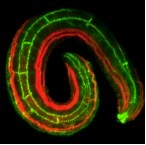I had the privilege of speaking at Greenbelt this summer, and while I was there I heard Rob Bell speak on the creative process in a talk entitled ‘Pure Undiluted Slog’. His main point was that creativity is primarily about how you see the world. In order to do anything at all creative you need to be able to look at things in a way that is somehow unique and articulate it in a way that people can identify with.
Bell used the example of Moses’ encounter with God in the wilderness of Horeb. If Moses had been trudging around with his head down he wouldn’t have seen the bush that was on fire. If Moses hadn’t been an observant person he would not have noticed that the bush was still intact despite the flames, and God wouldn’t have been able to get his attention in the way that he did. And the bush is always burning – God is always trying to get our attention in some way or another.
I also spent some time this summer in Madison, meeting with a number of scientists (see my earlier post with Kathy Strabala). One of the scientists I met was Professor Jeff Hardin, Chair of Zoology at University of Wisconsin-Madison. Molecular biology and biotechnology have convinced me that science is a creative process, and when I asked Jeff about the part that awe and wonder played in his own work in developmental biology, he came up with exactly the same point as Rob Bell.
Elizabeth Barrett Browning was on to something when she wrote that ‘Earth’s crammed with heaven, And every common bush afire with God; But only he who sees, takes off his shoes, The rest sit round it and pluck blackberries’. Taking time is a fundamental aspect of this. For example, there’s the story of the burning bush in the book of Exodus. Moses takes the time to stop and observe what’s happening. I can’t help thinking whenever I read that story, that if Moses hadn’t really taken the time, if he had been too focused on his agenda (maybe thinking about the next grant application), how would God have grabbed his attention?
Science is a different sort of creative process to writing, sculpture or film-making, but it’s a creative nonetheless, and looking at the world and coming up with original ideas is about the most important aspect of doing science well. (Part 2 of my interview with Jeff Hardin is here, part 3 here. More about Jeff’s work here.)





